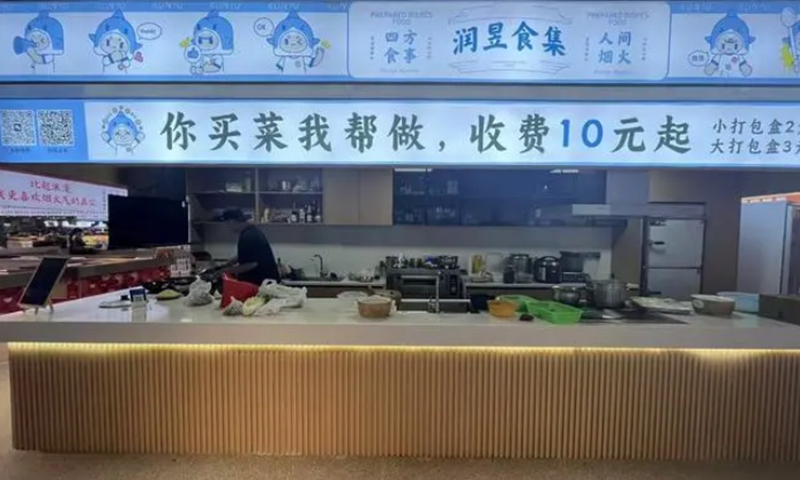ARTS / CULTURE & LEISURE
‘Cook-for-hire’ service stalls take off amid rising demand in China

A vendor offers cook-for-hire service. Photo: Courtesy of Zhou Kaikai
In Yiwu, East China's Zhejiang Province, a new "cook-for-hire" food stall in markets has been rising in popularity since opening in October. Customers are now lining up with ingredients in hand to have their meals prepared.
This trend isn't limited to Yiwu, similar "cook-for-hire" services are quietly spreading among cities in China. At these stalls, customers bring their own ingredients and then pay a small fee to have these fresh ingredients cooked on the spot into a customized, hot meal.
Despite the prevalence of food delivery, why has this alternative dining concept taken off?
Zhang Yi, CEO of iMedia, told the Global Times that one factor is the demanding schedules of people who have little time to cook, while another reason is the growing issues among ready-to-eat meals in the food delivery industry.
Hou Lei, a 51-year-old employee at a state-owned enterprise, regularly visits the third floor of Beijing's Jingshen Seafood Market, where they provide "cook-for-hire" services for seafood and other fresh items.
"I'm not confident in cooking complex dishes myself, so I value the convenience of having meals prepared without the hassle of dealing with food waste at home," Hou said.
He noted that he will buy seafood and vegetables downstairs, and then just head upstairs to the cooking section, where he pays a small fee for the "cook-for-hire" service.
"Ten yuan ($1.40) to cook a crab, eight to 10 yuan for vegetables - it's affordable, and I plan to keep using the service, especially on busy days," Hou explained.
One of the market's experienced cooks, Guo Ting (pseudonym), told the Global Times that she has been in the seafood cooking service for nearly 20 years and has noted a steady stream of customers, particularly during mealtimes. Now this service is expanding beyond seafood to broader categories of meals.
From an industry perspective, this trend reflects a broader evolution in consumer habits. According to CCTV(China Central Television), Jin Jingxiu, a manager at Yiwu's Xinmalui Market, noted that both vendors and consumers are adapting to this idea. Market research shows there is high demand in the local area, where many people are busy with work or are elderly residents who may find it challenging to cook at home. "For younger people, cooking after work isn't always feasible; for older folks, it's often too physically demanding," Jin said.
Zhang added that the earliest form of "cook-for-hire" services" emerged in Sanya city, South China's Hainan Province, mainly for seafood, but soon expanded as demand grew, especially among working families and the elderly.
His research team's recent survey at Shenzhen's Zhihui Farmer's Market revealed that demand surges during post-work hours, suggesting that these services might soon become a staple in markets near residential areas, particularly as the aging population grows.
The southern part of China appears to be leading in demand for this service, partly due to temperature differences: food stays warm longer on the way home in the south than it does in the cooler northern regions.
Another reason for the service's popularity is the increase in issues when it comes to food delivery, which has seen an increasing prevalence of restaurants relying on pre-made meals, which has pushed some consumers toward fresher, more transparent meal options.
"Some of these customers are actually switching from ordering takeout to opting for "cook-for-hire" services because they want fresh ingredients and transparency in food preparation," Zhang noted.
Stalls offering this service are down-to-earth and straightforward - a far cry from tech-heavy ventures like online food delivery or chef-at-home apps. Unlike startups that rely on heavy investments to build a customer base, these stalls reflect a simpler form of local dining. Customers can watch their food being cooked and eat it immediately afterward, giving them a sense of authenticity and transparency.
Still, the question remains: Why didn't this seemingly natural business model catch on sooner?
Zhang emphasized that one crucial factor was that conditions weren't conducive until now: both environmental and logistical barriers previously prevented it. With this service now expanding to several cities, ensuring regulatory standards and market entry conditions will be key for its sustainable growth.
Ultimately, the rise of "cook-for-hire" service stalls highlights a broader trend within marketplaces and communities, as they adapt to meet evolving consumer needs. "I believe it can be a growing trend in the future," Zhang said.



